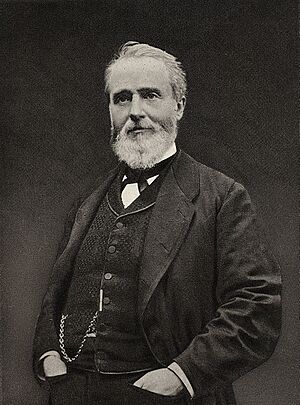Paul-Armand Challemel-Lacour facts for kids
Quick facts for kids
Paul-Armand Challemel-Lacour
|
|
|---|---|
 |
|
| Born | 19 May 1827 |
| Died | 26 October 1896 (aged 69) |
| Nationality | French |
| Occupation | statesman |
| Signature | |
Paul-Armand Challemel-Lacour (born May 19, 1827 – died October 26, 1896) was an important French statesman. A statesman is a skilled and respected leader in government. He helped shape France's politics during a time of big changes.
Contents
Early Life and Education
Paul-Armand Challemel-Lacour was born in Avranches, a town in northwestern France. He studied at a famous school called the École Normale Supérieure. After his studies, he became a professor of philosophy in the cities of Pau and Limoges.
Life in Exile
In 1851, Napoleon III took control of France in a sudden move called a coup d'état. Because Paul-Armand believed in a republic (where citizens elect their leaders), he was forced to leave France. He traveled around Europe and gave talks in Belgium.
In 1856, he settled in Zurich, Switzerland. There, he became a professor of French literature at the Federal Polytechnic Institute Zurich, which is now known as the ETH Zurich.
Return to France
In 1859, the government offered an "amnesty," which meant he could return to France without being punished. He tried to give lectures on history and art, but these were quickly stopped by the authorities. To support himself, he started writing for different magazines and newspapers.
Political Career
When the Second French Empire ended in September 1870, a new government took over. Paul-Armand was chosen to be the prefect (a top government official) for the Rhône region. In this role, he had to deal with a communist uprising in the city of Lyon. He resigned from this job in February 1871.
Joining the Assembly and Senate
In January 1872, he was elected to the French National Assembly, which is like a parliament. Later, in 1876, he was elected to the French Senate. At first, he was part of the "Extreme Left" political group. This group wanted big changes in society.
However, as he grew older, his views became more moderate. He became known as a leading voice for moderate republicanism. This meant he supported a republic but preferred slower, more careful changes.
Diplomat and Minister
Paul-Armand was a strong supporter of another important politician named Léon Gambetta. For a while, he even edited Gambetta's newspaper, the République française.
In 1879, he became the French ambassador (a country's official representative) in Bern, Switzerland. In 1880, he moved to London to be the ambassador there. However, he found that being a diplomat wasn't really his strong suit. He resigned in 1882.
In February 1883, he became the Minister of Foreign Affairs in the government led by Jules Ferry. This meant he was in charge of France's relationships with other countries. He held this position until November of the same year.
President of the Senate
In 1890, Paul-Armand was elected vice-president of the Senate. Then, in 1893, he became the President of the Senate, taking over from Jules Ferry. He held this important role from March 27, 1893, to January 16, 1896.
He was known for his clear and logical speeches, which made him one of the best speakers in France at the time. In 1893, he also became a member of the Académie française, a very respected group of French scholars and writers. He strongly defended the Senate's power against other parts of the government.
In 1896, his health began to fail, and he had to resign from his position. He passed away in Paris later that year.
Published Works
Paul-Armand Challemel-Lacour also wrote and translated several books:
- He translated a book called Geschichte der Philosophie by Heinrich Ritter (1861).
- He wrote La Philosophie individualiste: étude sur Guillaume de Humboldt (1864), which was a study on individualistic philosophy.
- He also edited the works of Madame d'Epinay (1869).
After he died, a collection of his speeches, called Œuvres oratoires de Challemel-Lacour, was published in 1897 by Joseph Reinach.
 | Roy Wilkins |
 | John Lewis |
 | Linda Carol Brown |

